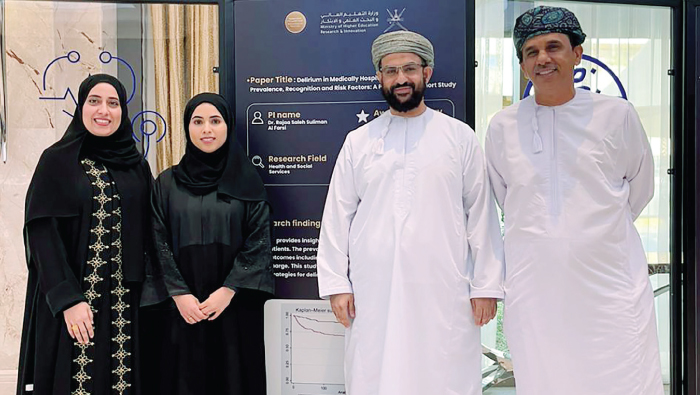
Muscat: An Omani researcher has worked on the prevalence of delirium cases among elderly people living in Oman.
The research project was aimed to assess the prevalence of delirium among elderly people hospitalised at Sultan Qaboos University Hospital as well as assessing the risk factors that may increase the likelihood of its occurrence and evaluating its short and long-term impact on health.
According to Dr. Rajaa Saleh Al Farsi, Internal Medicine Resident from Oman Medical Speciality Board, delirium is defined as a sudden and fluctuating disturbance in mental function, characterised by an inability to pay attention, disorientation, and inability to think clearly.
It is the result of an organic disease, in addition to the presence of risk factors that increase the chance of having delirium.
Among the many innovative research projects of the 10th National Research Award organised by the Ministry of Higher Education, Research and Innovation, ‘Delirium in Medically Hospitalised Patients: Prevalence, Recognition and Risk Factors: A Prospective Cohort Study’ by Dr. Rajaa Saleh Al Farsi, won in the Health and Social Services field in the Young Researcher’s category.
She said that this is the first study in the Sultanate of Oman that talks about delirium in elderly people hospitalised in internal medicine wards and one of the few studies done in the Middle East on this topic.
For the methodology, Dr. Rajaa and her team included 327 patients aged 65 years or older, admitted in the medical wards at Sultan Qaboos University.
Patients were screened for delirium using the 3-Minute Diagnostic Confusion Assessment (3D-CAM). Risk factors and clinical outcomes were assessed by interviewing patients, reviewing their medical records, and following up by phone calls 90 days and 1 year after hospital discharge.
Dr. Rajaa stated that the study showed prevalence of delirium among elderly patients admitted to medical wards was more than 55 percent, with hypoactive delirium being the most common type.
There are several risk factors that increase the risk of delirium including the presence of prior cognitive impairment, poor functional status, an increase in the number of medications the patient takes, the presence of a urinary catheter, dehydration, and electrolyte imbalance.
Moreover, delirium has a significant impact on short- and long-term health outcomes.
It is associated with increased mortality (all-cause mortality at 90 days (25.4% vs. 8.4%) and 1 year (35.9% vs. 16%) after hospital discharge), prolonged hospital admission and increased incidence of complications acquired from the patient’s presence in the hospital, including infection, bed sores, and upper gastrointestinal bleeding.
Through the study, Dr. Rajaa concluded that delirium is common among elderly patients hospitalized in general medical wards and it is associated with serious clinical consequences.
Early recognition, implementing effective preventive strategies for delirium, and developing geriatric wards are crucial. Further research is necessary to explore effective management strategies for delirium in general medical wards and to optimize patient care.
This research project was published in the Journal of Clinical Medicine. The research team included Dr. Rajaa Saleh Al Farsi, Dr. Abdullah Mohammed Al Alawi, Mrs. Juhaina Salim Al Maqbali, Dr. Aisha Ramadhan Al Huraizi, Dr. Taif Al Saadi, Dr. Noof Al Hamadani and Dr. Khalfan Al Zeedy.
Regarding her National Research Award win, Dr. Rajaa Al Farsi stated that “winning the National Research Award is a tremendous achievement for me and my research group members. It is a validation of our hard work, dedication, and passion for research. This award not only boosts our confidence as a researcher but also opens new opportunities for collaboration and funding. It serves as a motivation for us to continue making significant contributions to our field.”